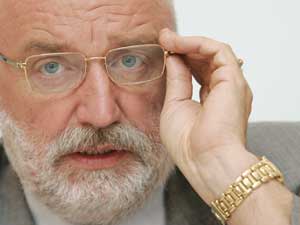Latvian president and prime minister set to make up - or break up
 Riga - Latvian Prime Minister Ivars Godmanis was due for a make-or-break meeting with President Valdis Zatlers on Monday after the president said he had lost confidence in his prime minister.
Riga - Latvian Prime Minister Ivars Godmanis was due for a make-or-break meeting with President Valdis Zatlers on Monday after the president said he had lost confidence in his prime minister.
The two leaders were due to meet at 4 pm (1400 GMT) following a weekend in which local media speculated that Godmanis could be about to resign.
The political temperature rose markedly on February 13 when Godmanis announced that plans to reduce the number of ministries in government had been shelved indefinitely and that he would not be inviting opposition parties to join him in the formation of a broader coalition than currently exists - a move which Zatlers had earlier insisted upon.
Zatlers' response was highly critical. "The premier in the course of three days radically changed his opinion about the plan for reorganization of the government and public administration that he had developed himself. Therefore I have to say that I no longer have confidence in Mr Godmanis," Zatlers said.
In return, Godmanis said he would resign if asked to do so by Zatlers, though he later pointed out that political power rested with the parliament and not the president.
Political analyst Peteris Vilnkelis told Deutsche Presse-Agentur dpa the situation remained confused.
"I don't think even they themselves know what is happening. I don't think the president properly thought through what he said, and I'm not sure that today he will insist on Prime Minister Godmanis handing in his resignation," he said.
The working relationship between the two Latvian leaders may not be as bad as it would appear, Vinkelis said.
Whatever the outcome, this is just the latest episode in a turbulent and complex few months for Latvian politics.
Zatlers has already issued a March 31 deadline for Godmanis' four-party coalition government to introduce constitutional reforms. Failure to do so would result in the president calling a referendum that would lead to the early dissolution of parliament, which is not due to be re-elected until 2010.
After years of rapid economic growth, the Baltic state's economy collapsed in late 2008, forcing the Godmanis government to ask for a 7.5-billion-euro (9.5-billion-dollar) economic bail-out from a variety of international sources in a deal brokered by the International Monetary Fund (IMF).
Under the terms of the bail-out, the government is introducing a series of tough measures aimed at rebalancing the Latvian economy which involve wage cuts, job losses and curbs on public spending.
Public anger at the cuts and a perceived lack of accountability from politicians led to riots in the streets of the Latvian capital, Riga, on January 13.
Then on February 3, farmers blockaded Riga with their tractors and forced the resignation of the agriculture minister. A day later, Godmanis survived a parliamentary vote of no-confidence. (dpa)